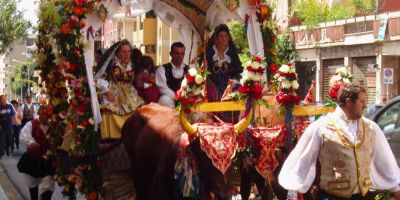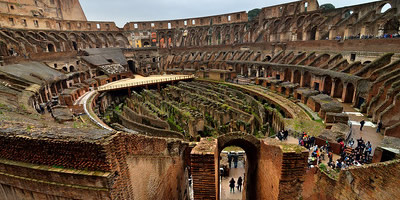Long live freedom!
Il 25 aprile: Commemorazione dell’Anniversario della Liberazione in Italia Ogni anno, il 25 aprile, l’Italia si ferma per commemorare uno […]
Read more
Alla scoperta della Zona Blu della Sardegna: Un’oasi di Longevità e Benessere La Sardegna, con le sue coste mozzafiato, le acque cristalline e le tradizioni millenarie, è nota per essere una terra ricca di bellezze naturali e culturali. Ma c’è un altro aspetto che rende questa splendida isola unica nel suo genere: la sua Zona Blu. Cosa sono le Zone […]
Read more
La Sagra di sant’Efisio è la festa più importante di Cagliari e si svolge ogni anno il primo maggio. Origini e Promessa: La storia di sant’Efisio e il voto che ha dato origine alla festa. Nel 1656 in tutta la Sardegna si diffuse la peste, specialmente a Cagliari in cui morirono diecimila persone. L’amministrazione comunale fece quindi un voto a […]
Read more
Il 25 aprile: Commemorazione dell’Anniversario della Liberazione in Italia Ogni anno, il 25 aprile, l’Italia si ferma per commemorare uno dei momenti più significativi della sua storia moderna: la liberazione dal regime fascista durante la Seconda Guerra Mondiale. Questa data rappresenta un simbolo di resistenza, coraggio e speranza per il popolo italiano, e viene celebrata con eventi, discorsi e manifestazioni […]
Read more
In this video, taken from our course “A Year with Veronica” – Intermediate level, Veronica wants to start the New Year in a big way! She talks about how to start the year with positivity and what to avoid so things don’t go wrong! She reminds us that “where there’s a will there’s a way”, also in the study of […]
Read moreOur Veronica, in the Befana version, explains to us the use of the conditional to give suggestions and advice. See also: Italian Culture: Italian Holidays Read the text and answer the questions.
Read moreThe accent determines the pronunciation of the words. In Italian it is always and only used on vowels, and never on consonants. In Italian we distinguish between: tonic accent; graphic accent. 1. The tonic accent All Italian words have the tonic accent which falls on one of the syllables of the word and determines a more marked pronunciation of this […]
Read moreThe apostrophe is a graphic sign (‘) which in Italian is used to indicate: the dropping of the final vowel of the word when followed by a word starting with a vowel (elision); the cancellation of the vowel, consonant or syllable at the end of the word (truncation). 1. In the first case, the apostrophe is mandatory with: the definite […]
Read moreThe correct form is un po’ with an apostrophe. Un pò with the accent is incorrect. We use un po’ to indicate a limited quantity or a scarce number. Prima di andare a letto mangio sempre un po’ di cioccolata. Il cielo è un po’ nuvoloso, sta per piovere. Ho un po’ di ansia per l’esame di domani. The expression […]
Read moreThe correct form is all’incirca, written detached and with an apostrophe. The expression circa derives from the adverb “incirca”, composed of the simple preposition “in” and the word “circa” which means “pressapoco”. In fact all’incirca is used to indicate an approximate quantity. Ho comprato all’incirca un chilo di pane. Arriverò al ristorante all’incirca alle otto di sera. La spesa totale […]
Read more
In Italian, the verbs essere (to be) and avere (to have) are called auxiliary verbs because they have the function of “helping” the other verbs to form compound tenses. The verb avere to have means to possess. Emma ha una maglietta verde. The verb essere (to be) means to stay or exist. Emma è a scuola. Qui c’è una palestra […]
Read more
Listen to this short video about the Colosseum in Roma and answer to the following questions. See also: Trevi Fountain, Rome – Italian Culture Piazza Navona, Rome – Italian Culture
Read moreBoth forms are correct but have different meanings. Ce n’è is a very common expression in colloquial Italian. However, it is often difficult to figure out how to write this expression correctly. Ce n’è is made up of the particles “ce” and “ne” and the third person singular of the present indicative of the verb to be “è”. The pronominal […]
Read moreThree words that united form one; its use can be twofold: it can have the same intent as “after” (consecutive-temporal function), or it can introduce a condition caused by the previous action (adversative function). Dopo di che it is what we can define as the original form, without an accent because “che” by itself never requires an accent. Lucia ha […]
Read moreThe correct form is per cui, detached. The form percui, all attached, is wrong. The expression per cui is composed of the simple preposition “per” and the relative pronoun “cui”. Per cui has two different meanings. In colloquial Italian, the expression per cui is used as a conjunctive locution with deductive or conclusive value in reference to what was previously […]
Read moreIn Italian the conjunction “e” and the simple preposition “a” in some cases take the final “d” and become “ed” and “ad“. Ed and ad are used only when the following word begins with the same vowel. Gli ho detto di studiare ed esercitarsi meglio per l’esame. Ho aiutato Marco ad aggiustare il suo computer. Sono andata ad ascoltare il […]
Read moreIn Italian, when we want to express our preference, we use the qualifying adjective preferito The adjective “preferito” indicates a person, an animal or a thing that is considered better from our point of view. Il mio libro preferito è Harry Potter. La mia città italiana preferita è Cagliari. I miei animali preferiti sono i gatti e i cani. The […]
Read more